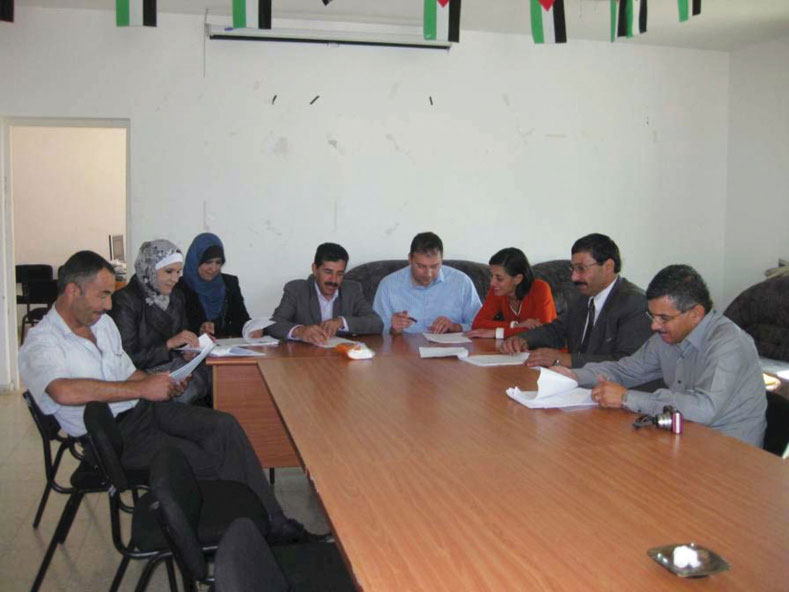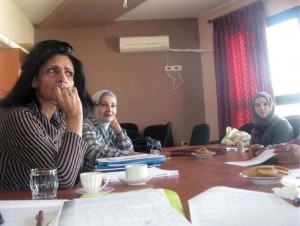WEST BANK:
Local Organizations Strengthen Effectiveness, Promising Tangible Community ServicesFebruary 23, 2011
 It’s a workday afternoon in Nablus City, seemingly like any other. Yet, at the Yalu Society for Development Studies office, representatives of eleven community-based organizations are developing their strategic and executive plans under the watchful eye of Shahnaz Jubran, technical team member of the Community Leadership Empowerment Program (CLEP). Funded by the State Department’s Middle East Partnership Initiative, the success of the CLEP program is due in great part because it promotes community-based needs.
It’s a workday afternoon in Nablus City, seemingly like any other. Yet, at the Yalu Society for Development Studies office, representatives of eleven community-based organizations are developing their strategic and executive plans under the watchful eye of Shahnaz Jubran, technical team member of the Community Leadership Empowerment Program (CLEP). Funded by the State Department’s Middle East Partnership Initiative, the success of the CLEP program is due in great part because it promotes community-based needs.
Thanks to CLEP’s training in Strategic Planning and participatory application, sessions such as the one being led by Jubran are being replicated all over the West Bank. In Nablus, the Yalu Society focuses on income generating projects that promote economic empowerment for women and children, raising awareness of their political, social and economic rights. Its offices were refurbished by a CLEP in-kind grant in August of 2009. Today, seven women, several of whom are volunteers, join a member of the village council of Azmout in eagerly awaiting Jubran’s introduction to the strategic planning session. They met a week ago as a committee and now need to develop the various elements that will lead them to their first strategic plan incorporating vision, mission, strategic goals, objectives, and strengths among other requirements.
Now in its second month, CLEP’s second phase has generated remarkable dedication and commitment for Yalu participants and other community-based organizations. CLEP differentiates itself by not only providing training, but also by providing opportunities where these skills can be applied, such as in these strategic planning sessions. This emphasis on the linkages between training and application resonates with participants. This Creative-led strategic planning training is helping local organizations formulate a five-year strategic plan for the continuity of their services.
For Yalu’s director, Insaf Odeh, who is responsible for overall management including fundraising, program design, partner identification and resource management, hands-on Strategic Planning training is a very new experience. “We took a three-day strategic planning workshop in the past which was good but nothing like what we are doing now. We will actually have a five-year plan by February,” she said.
Today’s Strategic Planning session focuses on the institutional needs of partners to grow in proportion with their community’s demands and to promote a more robust and sustainable institutional capacity. Following this critical and participatory milestone, the community-based organizations will submit proposals for in-kind awards based on the plans they have drafted.
“Community-based organizations or “CBO’s” target grass roots groups (women, youth and children in remote areas). These are the institutions that provide these groups with services such as awareness-raising in specific issues; health, politics, economy and gender,” said Jubran. “Strategic Planning will help with sustainability and independence and raise awareness of the needs of the local communities and target groups. The sessions have helped CBO representatives learn more about participatory leadership and engagement. Volunteers, general assemblies and other local organizations are now involved in internal decision making.”
CLEP’s initial phase made grants available to 114 CBOs. Most organizations are first time grant recipients representing local governments, youth clubs and women’s groups often in remote communities with limited access to public services such as health, education and basic infrastructure. The success of the grants has generated a higher community demand for CBO services.
 The Palestinian Child Home Institute serves the town of Bethany just three miles from Jerusalem through civic education for youth and women. There, young men are gathered for their second Strategic Planning session led by Creative’s technical advisor, George Akroush. “This second phase is true development work,” said Akroush. “We address participation and decision making in the design of the programs. Strategic planning itself is a process based on community needs rather than a document. It is the backbone of any organization that wants to help local society through designing responsive programs that meet community needs.”
The Palestinian Child Home Institute serves the town of Bethany just three miles from Jerusalem through civic education for youth and women. There, young men are gathered for their second Strategic Planning session led by Creative’s technical advisor, George Akroush. “This second phase is true development work,” said Akroush. “We address participation and decision making in the design of the programs. Strategic planning itself is a process based on community needs rather than a document. It is the backbone of any organization that wants to help local society through designing responsive programs that meet community needs.”
For Mayor Sulaiman Al Assa of Obaydiyeh, a town at the lowest geographical point in Bethlehem district where sewage and rainwater naturally accumulate, rainwater collection and wastewater management are a priority for the municipality. “Strategic planning eases communication with potential donors and is teaching us to design need-based programs,” said Mayor Assa. He makes sure to attend each Strategic Planning session noting he is enthusiastic to finalize the strategic plan that includes municipal wastewater and other infrastructure projects to have a professionally crafted document to submit to various donors.
“I majored in management and have my own small business, yet, I have never been able to apply the theory I learned to real world scenarios,” said Ammar Ghabbash, a CBO member at the Bethany session. “Strategic planning is a requirement of donors that we didn’t know how to deal with in the past. It expedites the grant process. It has also helped the organization identify a real developmental plan.”
CLEP is funded through the U.S. Department of State, Bureau of Near Eastern Affairs, Office of the Middle East Partnership Initiative (MEPI). MEPI is a unique program designed to engage directly with and invest in the peoples of the Middle East and North Africa (MENA). MEPI works to create vibrant partnerships with citizens to foster the development of pluralistic, participatory, and prosperous societies throughout the MENA region. MEPI partners with local, regional and international non-governmental organizations, the private sector, academic institutions, and governments. More information about MEPI can be found at: www.mepi.state.gov.
– Jack Melcki
